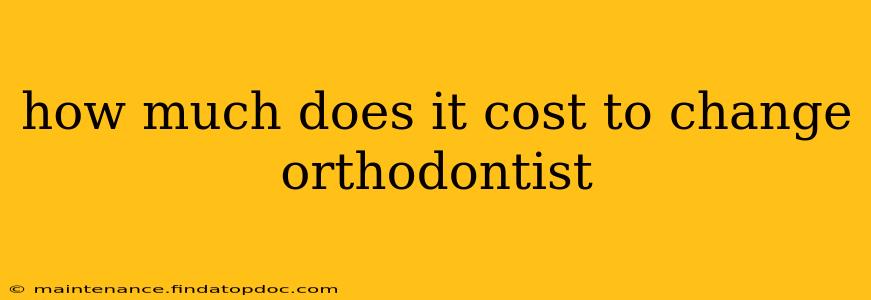Switching orthodontists can feel daunting, especially when considering the financial implications. The cost isn't a fixed number; it varies significantly based on several factors. This comprehensive guide breaks down the potential expenses and helps you navigate this decision.
What Factors Influence the Cost of Changing Orthodontists?
Several key elements determine the overall cost:
-
Remaining Treatment Time: This is arguably the biggest factor. Switching early in treatment will generally be cheaper than switching later, as less work remains. Your new orthodontist will need to assess your current progress and create a revised treatment plan, which might involve additional procedures or adjustments.
-
Treatment Plan Changes: Your new orthodontist might recommend a different approach than your previous one. This could lead to additional costs, especially if it involves more extensive work or different appliances. They might need to undo some of the previous work to start anew, resulting in added expenses.
-
New Diagnostic Records: You'll likely need new X-rays, photographs, and possibly impressions or scans. These diagnostic tools are essential for the new orthodontist to accurately assess your teeth and jaw alignment and create a personalized treatment plan. The cost of these records can vary depending on the extent of the necessary imaging.
-
Initial Consultation Fees: Most orthodontists charge a fee for the initial consultation. This fee is typically separate from the overall treatment cost and won't be reimbursed by your previous orthodontist.
-
Records Transfer Fees: While some orthodontists transfer records at no cost, others might charge a fee to cover the administrative work involved in reviewing and incorporating the previous records into your new file.
How Much Can I Expect to Pay?
There's no single answer. The cost can range from a few hundred dollars for a simple transfer and minor adjustments to several thousand dollars if significant rework or a completely revised treatment plan is necessary. Many factors contribute to the overall cost making a precise number impossible to pinpoint without consulting with a new orthodontist.
What about Insurance?
Your dental insurance coverage may help offset some costs. However, coverage varies widely, and many insurance plans don't cover the entirety of orthodontic treatment. It's crucial to contact your insurance provider to understand your benefits and limitations concerning changing orthodontists. They can explain whether any portion of the new consultation, diagnostic records, or treatment plan changes will be reimbursed.
Can I Get a Payment Plan?
Most orthodontic practices offer payment plans to make treatment more manageable. Discuss payment options with your prospective orthodontist during your initial consultation. They can outline various payment arrangements to fit your budget and financial capabilities.
H2: What if My Current Orthodontist Is Unprofessional or I’m Unhappy with Their Services?
If you're unhappy with your current orthodontist's professionalism or the quality of care, changing practices is understandable. While cost is a factor, your comfort and confidence in your orthodontist are paramount. Prioritize a positive and productive treatment experience.
H2: How to Minimize Costs When Switching Orthodontists
To minimize costs, consider:
- Switching early in treatment: The earlier you switch, the less likely it will be that significant rework will be required.
- Clearly outlining your concerns: Before switching, carefully articulate your reasons for seeking a new orthodontist to your current provider. Sometimes, resolving issues with your current orthodontist is less costly and stressful than a complete switch.
- Inquiring about transfer fees: Call prospective orthodontists and ask about their policies regarding record transfer fees.
- Seeking multiple consultations: Getting quotes from multiple orthodontists enables you to compare costs and treatment plans.
Ultimately, the decision to change orthodontists is a personal one. Carefully weigh the costs and potential benefits, remembering that a positive and productive treatment experience is invaluable. Don't hesitate to contact multiple orthodontists to get a comprehensive understanding of the potential expenses involved in your specific situation.
